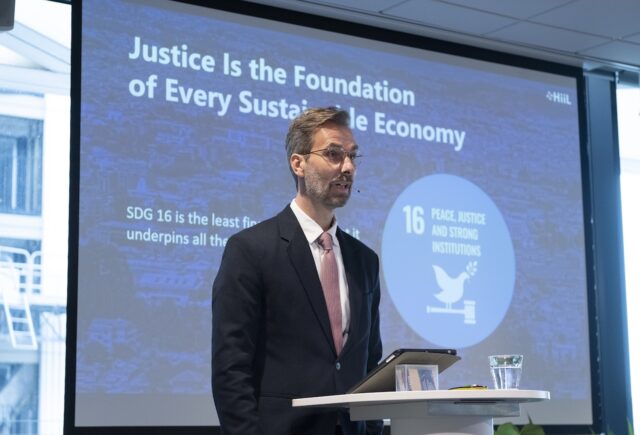Investment by France’s TotalEnergies in fast-growing Indian renewables firm Adani Green Energy reflects wider investor interest in decarbonisation projects in the country.

India’s Adani Green Energy (AGEL) has announced the completion of a deal to transfer 1.05 gigawatts of its renewable energy portfolio to a joint venture with France’s TotalEnergies – a move that underscores the growing potential for both mainstream and impact investments in renewable power and other climate-related sectors in India.
Under the terms of the venture, unveiled last September, TotalEnergies invested $300m (€273m) in an AGEL subsidiary to take a 50% stake in the projects under its umbrella.
The portfolio is a mix of Indian solar and wind energy projects, including 300 megawatts (MW) of projects already in operation, 500MW of assets under construction and 250MW of those under development. It builds on existing investments by the French energy company, which in 2021 took a 20% stake in AGEL, which is majority-owned by India’s Adani Group.
AGEL has said it wants to become the country’s leading renewable energy producer, with a target of holding 45GW of capacity by 2030. Its operational, under-construction, awarded and acquired assets currently amount to 20.4 GW.
The investment underscores growing belief among foreign investors in the potential of the Indian renewable energy market to make solid returns, while helping to wean the country off coal and other fossil fuels, which account for almost 60% of India’s power generation capacity, according to government data. The country is the world’s second largest coal user after China and third largest carbon emitter after China and the US (though it remains well down the global league table in terms of emissions per capita).
In September, Patrick Pouyanné, TotalEnergies’ CEO, said the firm’s investment in AGEL reflected the attractiveness of the renewable power market in India, due to its size and rapid growth and because India was developing a merchant power market – one where energy producers can sell power into a wholesale market rather than relying on fixed-term contracts with buyers.
The potential of India’s green energy market for investors of all hues is substantial. In a recent report, energy think tank Ember estimated that India’s stated aim of more than tripling renewable energy capacity by 2030 would require close to $300bn in financing between now and then, representing a massive step up in funding compared to current levels. A May 2023 report from the Reserve Bank of India said around $1trn would need to be spent by 2030 if Indian industries were to comply with climate change norms.
Against this backdrop, wider investment in decarbonisation of the Indian economy is becoming a focus for development finance institutions (DFIs) and impact investors.
Last June, the World Bank signed off on $1.5bn in financing to help India promote green energy by scaling up renewable energy, developing green hydrogen, and supporting climate finance for low-carbon energy investments.
In November, Impact Investor highlighted how India was becoming a strategically important market for climate finance for British International Investment (BII). The UK DFI said in 2023 that it plans to invest around $1bn in Indian climate-related projects by 2026. Impact funds are also taking a keener interest in India, such as Swiss-based responsAbility, whose Global Climate Partnership Fund, signed a series of loan agreements with Indian non-banking financial institutions in 2023 to facilitate climate-positive investments in SMEs.





